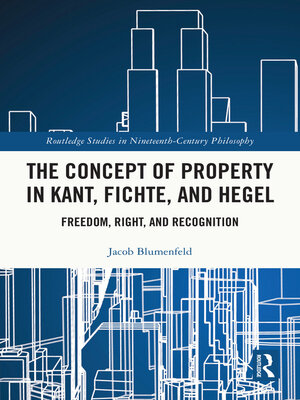The Concept of Property in Kant, Fichte, and Hegel
ebook ∣ Freedom, Right, and Recognition · Routledge Studies in Nineteenth-Century Philosophy
By Jacob Blumenfeld

Sign up to save your library
With an OverDrive account, you can save your favorite libraries for at-a-glance information about availability. Find out more about OverDrive accounts.
Find this title in Libby, the library reading app by OverDrive.



Search for a digital library with this title
Title found at these libraries:
| Library Name | Distance |
|---|---|
| Loading... |
This book provides a detailed account of the role of property in German Idealism. It puts the concept of property in the center of the philosophical systems of Kant, Fichte, and Hegel and shows how property remains tied to their conceptions of freedom, right, and recognition.
The book begins with a critical genealogy of the concept of property in modern legal philosophy, followed by a reconstruction of the theory of property in Kant's Doctrine of Right, Fichte's Foundations of Natural Right, and Hegel's Jena Realphilosophie. By turning to the tradition of German Rechtsphilosophie as opposed to the more standard libertarian and utilitarian frameworks of property, it explores the metaphysical, normative, political, and material questions that make property intelligible as a social relation. The book formulates a normative theory of property rooted in practical reason, mutual recognition, and social freedom. This relational theory of property, inspired by German Idealism, brings a fresh angle to contemporary property theory. Additionally, it provides crucial philosophical background to 19th-century debates on private property, inequality, labor, socialism, capitalism, and the state.
The Concept of Property in Kant, Fichte, and Hegel will appeal to scholars and advanced students interested in 19th-century German philosophy, social and political philosophy, philosophy of law, political theory, and political economy.







